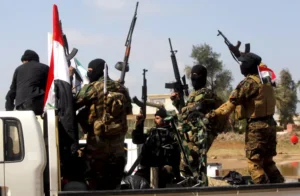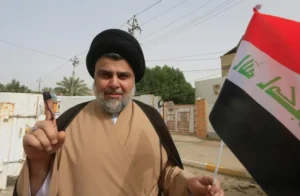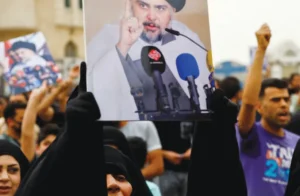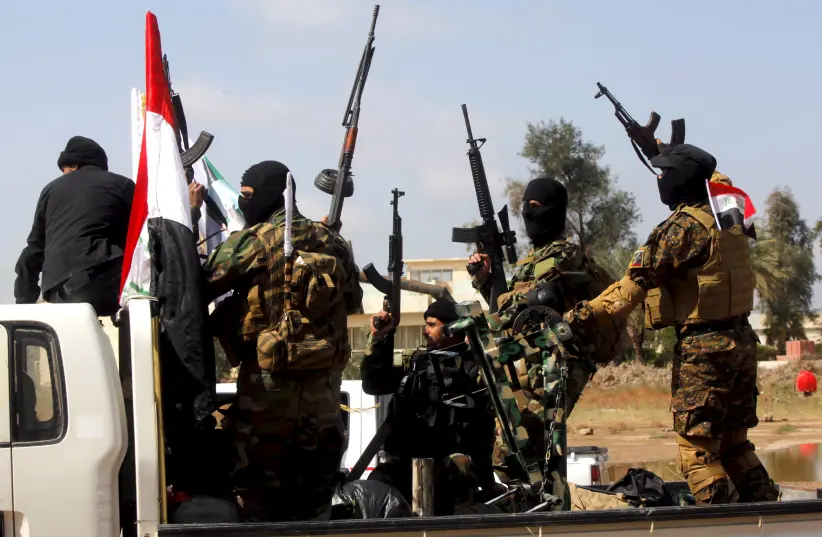In some political science classes or ideologies of anarchism, Iraq might be considered one of the first post-states.

Iraq’s non-leader Muqtada al-Sadr, who usually makes headlines for being unwilling to actually take charge of anything despite having the support of millions of Iraqis, withdraw his party’s 73 parliamentarians from the parliament, making it harder for Iraq to form a government.
Iraq has basically been in political chaos for years. Yet the miracle of Iraq is that it continues to function, despite not really having any leaders.
In some political science classes or ideologies of anarchism, Iraq might be considered one of the first post-states, a place that exists beyond borders, showing that people can live without the need for governments. However, this breaks down when one realizes that the country has been taken over, at least in part, by Iran in the center and south, and by Turkey in parts of the north.
Between these two powerful neighbors, there are other governments, including the wealthy, stable and relatively powerful Kurdistan autonomous region. There is also the Iranian-backed Hashd al-Shaabi, the system of militias that run parts of Iraq. There is also a competent counter-terrorism force.
So Iraq is a kind of miracle because the country has gone from once being a stable and wealthy state governed by a genocidal maniac known as Saddam Hussein, in the 1980s, to living under sanctions in the 1990s, to the US invasion of 2003, to the chaos of insurgency and then ISIS genocide in 2014, and then the current non-leadership that Iraq is living under.

The state no one wants to lead
Iraq, of course, has a leader in name.
It has a president in Barham Salih, and Mustafa Kadhimi, the well-meaning prime minister, who helps hold the country together and also tries to broker peace between Saudi Arabia and Iran. And he also works with Egypt, Jordan and Syria, and ostensibly hopes that Turkey will stop carrying out airstrikes on civilians in Sinjar.
Ankara, which backs extremists in the region and enabled thousands to cross into Syria to join ISIS in 2014, continues to destabilize Iraq, claiming to fight “terrorism.” Meanwhile, Iran uses Iraq as a jumping-off point to attack US forces and threaten Israel via Syria.
Sadr, the populist, continues to play at politics but refuses to lead. He has said he will not participate in elections due to corruption of the state. But it is a state he refuses to lead. “The unprecedented mass withdrawal of the al-Sadr bloc has dramatically altered the political landscape in Iraq, throwing government formation talks into further doubt,” says Al Jazeera.
At Al-Ain Media in the Gulf, a writer named Ali Al Sarraf wonders why the options for Sadr have closed in on him. “Was his departure from the political process moody, or were there reasons that revealed a more dangerous reality?” His discussion of the matter points to claims that there is obfuscation going on in Iraq.
Writing of Sadr, the author notes that “he preferred to give up everything, including his current seats in Parliament. What caused a seismic effect on the balance of forces? Since the compensation substitutes came mostly from the pro-Iranian groups, these groups suddenly became a dominant force, and they could alone form the government if they wanted.” He is noting here that Iran is the main beneficiary of Sadr’s withdrawal.

Iraqi nationalism
Sadr has posed as an Iraqi nationalist in the past. Some in the West have hopes for “nationalism” in Iraq. These are the former diplomatic types in the West who always like “nationalism” abroad, but dislike it at home. They are the kind of people who liked Saddam but didn’t say so. They are the kind of people who believed Sadr might be bribed into being a new strongman, after the former investment in Nouri al-Maliki as a strongman failed.
Maliki brought ruin to Iraq and empowered sectarianism. Maliki still exists and is backed by Iran and wants to regain power. Meanwhile Sadr, the “nationalist” has proven that he is incapable of leading and the insinuation by some critics is that, at the end of the day, he still is pressured by Iran to give in and that he prefers leaving office to letting Iran run Iraq.
Either way, the question is what is being done to Iraq during its miraculous lack of leadership. A huge and important country, the “near abroad” of Iran, the buffer between Iran and the Gulf. It turns out huge sums have allegedly been “looted” from Iraq, the Al-Ain article claims. “By some estimates, it allowed the looting of at least $400 billion of its first trillion dollars in oil revenues during the first fifteen years after the invasion of Iraq….Most of this money went to Iran. This spoiled many aspects of the international sanctions against it, and provided it with the ability to practice more acts of escalation and destabilization in the region.”
So Iran uses Iraq, it consumes and eats Iraq. It is also accused of flooding Iraq with drugs and arms for militias. Of course, Iran doesn’t see it this way. Iran makes movies that bring tears to the eyes of the audience when Qasem Soleimani helps save Iraq from ISIS. Although both of these claims could be true, Iraq was “saved” by Iran and Iran then looted it. That’s what the Soviets did to Europe too, they saved Europe from Nazism and then looted eastern Europe. The savior can also be the abuser.
Al-Ain’s article has an answer: “This transformation provided a positive indication that Iraq could find an authority that actually combats corruption. However, al-Sadr’s withdrawal from parliament and the political process brought the corruption ball back to its first place…This may have been the first trigger for feelings of frustration.
Given that Iranian-affiliated groups are in fact armed forces, and dominate many positions in government institutions, the battle against corruption may have seemed a lost battle in advance [i.e it was lost before it began]. Especially since the purges [of the corrupt] would have led to armed conflicts and divisions within the security institutions themselves.” Indeed, whenever Kadhimi has tried to confront the pro-Iran axis in Iraq he has been threatened. Pro-Iran groups even flew an explosive drone into his house.
The article about Iraq has some insight. It notes that Sadr tried to buck the sectarian system. He wanted to work with the Kurdish parties, PUK and KDP, he wanted to work with Sunni parties and this would have eroded Iran’s role. This is a reminder of Ayad Allawi’s ill-fated attempts to run Iraq more than a decade ago. The US under the Obama administration, seeking to leave Iraq and preferring a “strong” leader, even if the leader was working for Iran, pushed Allawi aside. Sadr has now pushed himself aside. Washington has little influence these days in Baghdad.
The Al-Ain article has another insight: “The clash with the Kurds over the management of the oil fields in northern Iraq has become a constitutional clash. This prompted the Kurdish leaders to suggest that they would be the first to leave the political process, unless their demands regarding the independence of Kurdistan’s oil wealth from the authority of the center were met.” So Al-Sadr found all options closed. He couldn’t get Kurdish parties on board, he didn’t have Iran’s backing.
The problem of pro-Iranian groups
But the pro-Iran groups also have a problem.
“Pro-Iranian groups, which celebrated by winning a surprise prize, will not find Kurds who support their pro-Iranian approaches.” Indeed, they will not control Iraq. “The militias affiliated with Iran continued to attack the headquarters of the Kurdish parties in Baghdad until they were closed. [Iranian-backed groups have attacked Erbil in the Kurdistan region]… the Iranian Revolutionary Guards took charge of directly performing this task, during the months of negotiations between the blocs on forming the government, in order not to embarrass its [local] groups.”
The article notes that “the Kurds are now threatening to withdraw from the political process and return to the pre-2003 conditions in which the Kurdistan region enjoyed undeclared independence.” Meanwhile Rudaw media in Erbil notes that “the Prime Minister of the Kurdistan Region Masrour Barzani on Monday stated that Erbil has always been willing to resolve issues with Baghdad in accordance with the Iraqi constitution, stressing that the Region’s rights must not be violated.” Barzani has said that “regarding the relations with the federal government, the PM stressed that the Kurdistan Region has always been ready to resolve issues with Baghdad on the basis of the constitution. The Kurdistan Region has fulfilled its duties, and demands that its constitutional rights are not violated.”
The Iraqi top court in February ruled the Kurdistan Region’s oil and gas law to be “unconstitutional,” therefore striking down the legal basis for the independence of the Region’s oil and gas sector, Rudaw says. “The KRG responded to the decision, saying that the court’s ruling is not only ‘unconstitutional’ but also ‘unjust’.”
Now Iraq enters a new political chaos. But the miracle that the country continues to remain relatively stable is indeed a miracle whereby an ungoverned country continues to function.

